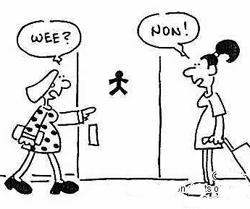Quick English: More False Friends
There are some words that seem to make learning a new language easier - those words that don't take much translation in order to use. Maybe just change an accent or an ending and come up with the same meaning. Unfortunately, some words are much trickier than that.
False friends are pairs of words in two different languages that look similar but have different meanings.
We've talked about false friends before. There are so many between different languages that we wanted to focus on a few more common mistakes. We'll try to save you some embarrassing mistakes in your conversations!
In this post, we are focusing on Spanish and French false friends.
Spanish
absolutely/en absoluto
- absolutely (English): definitely, completely, totally
- en absoluto (Spanish): absolutely not, definitely not
- complexion (English): appearance of the skin
- complexión (Spanish): build of the body
deception/decepción
- deception (English): the act of making someone believe that something is untrue
- decepción (Spanish): a disappointment
- exit (English): something, such as a door, used to leave a place
- éxito (Spanish): success, accomplishment
adept/adepte
- adept (English): to be particularly good at something
- adepte (French): a follower or an enthusiast
decade/décade
- decade (English): a period of ten years
- décade (French): a period of ten days
- mentor (English): someone who teachers or gives advice to someone less experienced
- menteur (French): a liar
raisin/raisin
- raisin (English): a dried grape
- raisin (French): a grape (berry used in making wine)
There are false friends in nearly all languages. Have you come across any confusing word pairs when learning languages? Share them with us in the comments!
